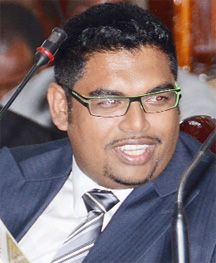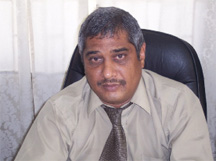The implementation of, and full use of the Single Window Automated Processing System (SWAPS) will benefit the business community and reduce the cost of doing business in Guyana, Acting Minister of Tourism, Industry and Commerce, Irfaan Ali said
According to the Government Information Agency, Ali that this achievement will also impact positively on Guyana’s implementation of the Caricom Single Market and Economy (CSME) since information for businesses can be shared across borders. He said that the SWAPS has been tried and tested and has fulfilled the complete solid test that would make it an undoubtedly strong system to provide all the answers in terms of improving efficiency. Ali was at the time addressing a gathering at the ‘SWAPS for trade transactions in Guyana’ stakeholder workshop at the Regency Hotel last week Monday.

SWAPS is expected to further reduce the cost and time incurred by businesses. It will simplify, harmonize and electronically integrate the business processes of the licensing bodies that account for the transactions associated with Guyana’s trade. According to GINA, Guyana is now among four countries in the Caribbean which are implementing aspects of the system.
There are also 49 countries, internationally, which have implemented components of the system while 29 others have fully implemented the system. 89 other countries have some other form of electronic system to improve business efficiency. The Minister extolled the benefits of SWAPS which will improve the way business is done and ensure that Guyana’s rank on ease of doing business indicator rises. He also acknowledged the hiccups experienced with the implementation of TRIPS – the Total Revenue Integrated Processing System which is presently in use for trade transactions.
Ali said that the use of SWAPS would require medium and long-term planning by the Private Sector. He underscored, “They (the Private Sector) need to aggressively get their membership to understand that the country’s infrastructure is naturally progressing along an ICT backbone that requires them to be up-to-date, to modernise, and improve their system of efficiency because at the end of the day there must be an integration of all the stakeholders in the sharing of information.” Ali indicated that the government has been focusing on improving the business environment and efficiency. At the level of the Competitiveness Board, areas where improvements are needed have already been identified and the actions required for implementation have been outlined. This is projected to result in Guyana moving from a rank of 113 to about 80 on the Doing Business Indicator, three years from now.
Commissioner General of the Guyana Revenue Authority (GRA), Khurshid Sattaur stated, “It is because of the need to have these improvements in conducting business that we have chosen to embrace this concept of the single window application, and I think it is one that will contribute significantly to how we conduct our affairs, not only the GRA, but with other agencies with which we collaborate.”
GINA said that Sattaur acknowledged that the GRA is the agency that most businesses interface with, and it has a role to play in trade activities. He said there are significant benefits with regards to the use of SWAPS which would have a direct impact on reducing costs and improving data collection and sharing, supporting risk management and speeding-up the processing of goods and documents. These will in turn reduce the time taken to conduct business transactions.

Sattaur noted that one of the challenges of the SWAPS implementation is the movement from a paper to a paper-less world. He emphasised, “We are hoping that with improved technology we would be able to grant the licences that are required in a speedier manner, and if therefore the SWAPS is used effectively, we would have greater inter-agency cooperation among the different agencies.” Chairman of the Private Sector Commission, Ronald Webster agreed with Minister Ali’s call for the private sector to be more modernised. He also highlighted the positives of SWAPS, with regards to trade facilitation and transactions, reducing transport cost, promoting transparency and harmonisation of regulations, efficient and transparent customs procedures and simplifying trade documentation and processing. He cited Singapore as a country which has successfully implemented the SWAPS resulting in an increase in their Gross Domestic Product (GDP). Webster committed the Private Sector Commission’s support in the implementation of SWAPS and said they are looking forward to the full implementation in the near future, GINA added.




